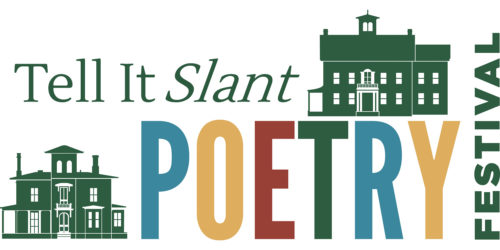
The Tell It Slant Poetry Festival returns September 15-21!
Join us for a week of events happening both online and in-person at the Museum.
The Emily Dickinson Museum’s annual Tell It Slant Poetry Festival is an event with international reach that celebrates Emily Dickinson’s poetic legacy and the contemporary creativity she and her work continues to inspire from the place she called home.
This year’s line-up features a talented group of poets from around the world including a reading by National Book Award and MacArthur Genius grantee Terrance Hayes with award-winning poet Krysten Hill, generative writing workshops, poetry panels, an open mic, live music, and more. The cornerstone of the Festival, the Emily Dickinson Poetry Marathon, is an epic reading of all 1,789 of Emily Dickinson’s poems across the Festival week. Learn more about the 2025 lineup below.
FESTIVAL TICKETS:
Free Festival access is available. However, registrants are encouraged to consider choosing the “Pay Your Way” ticket price of $20 per event. Revenue from Festival tickets supports honoraria for participating poets and the production costs of high-quality hybrid Festival events. Purchase 10 or more Pay Your Way tickets, and we will gift you an official Emily Dickinson Museum tote bag!
Small Group Workshops: This year, the Festival is offering three concurrent workshops for in-person participants on Sunday morning. Due to the limited event capacity, these workshops are available for a fee of $25. Tickets for small group workshops on Sunday must be purchased separately. See the Festival ticket menu.
A limited number of VIP Festival tickets are available at two levels: VIP, and VIP Dinner Guest. At both levels, these tickets offer a heightened Festival experience that includes access to all festival programs and the small group workshop of your choosing, reserved seating, a Festival swag bag, and a private reception and tour of the Homestead art installation, ‘A Something Overtakes the Mind’. At the VIP Dinner Guest level, ticket holders (only six total seats available!) are invited to an intimate dinner on Saturday, September 20, in the Dickinson dining room at the Homestead with Festival headliners Terrance Hayes and Krysten Hill, and Jane Wald, the Jane and Robert Keiter Family Executive Director of the Emily Dickinson Museum.
For all tickets, donations in support of the Museum’s programming are welcome in the final step of registration. Your support is deeply appreciated.
REGISTER
THE SCHEDULE:
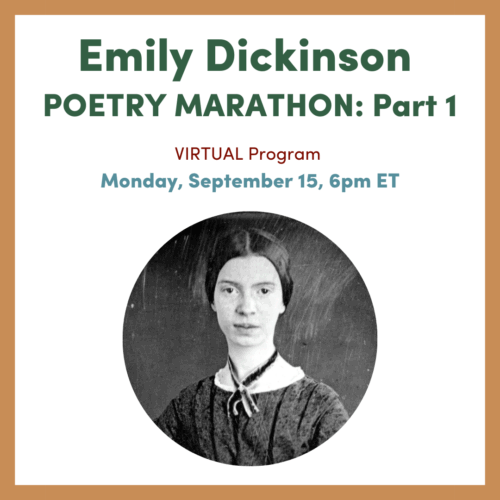
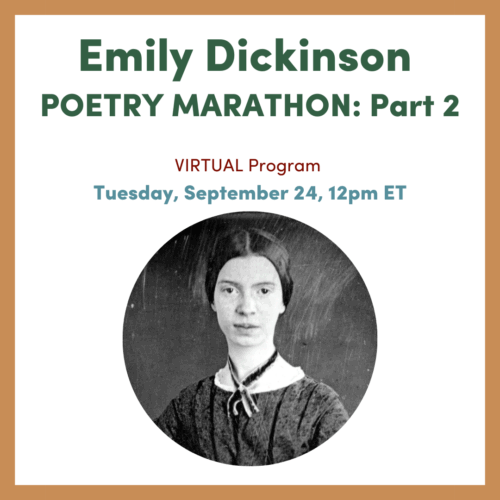
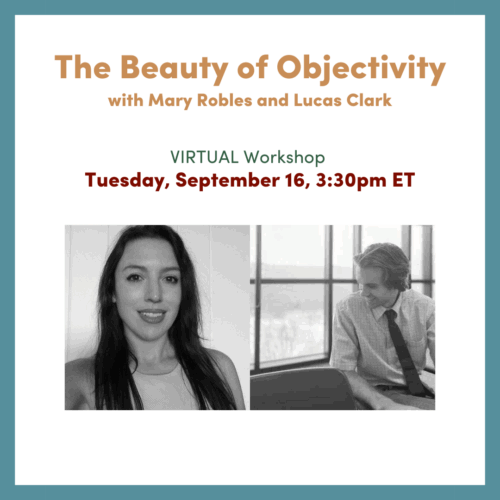
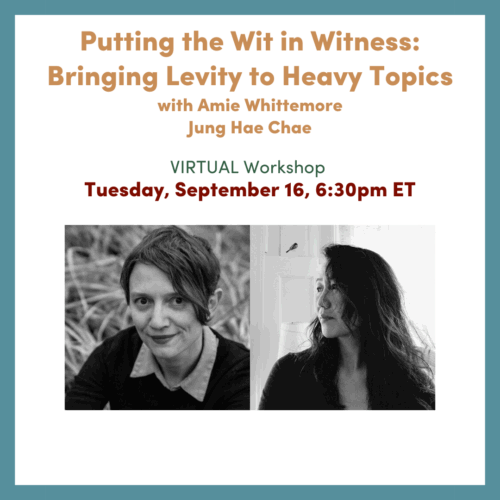
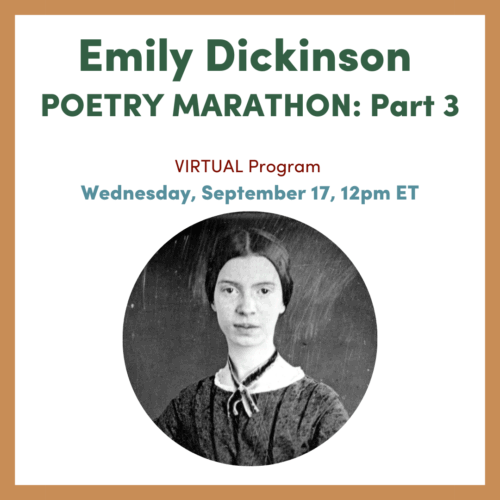
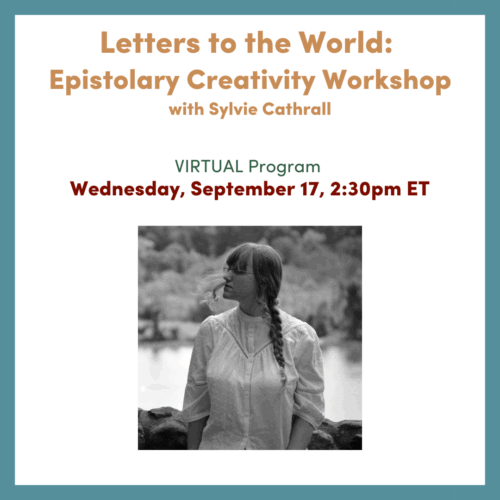
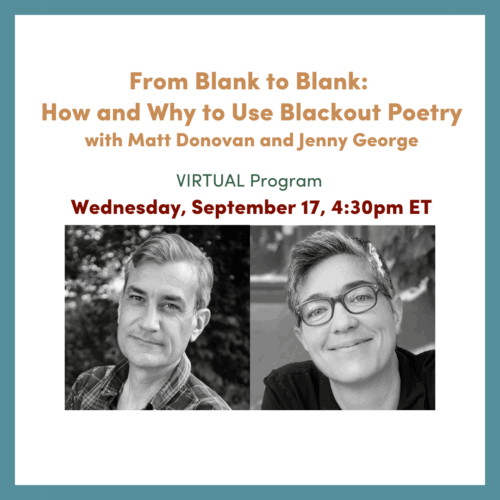
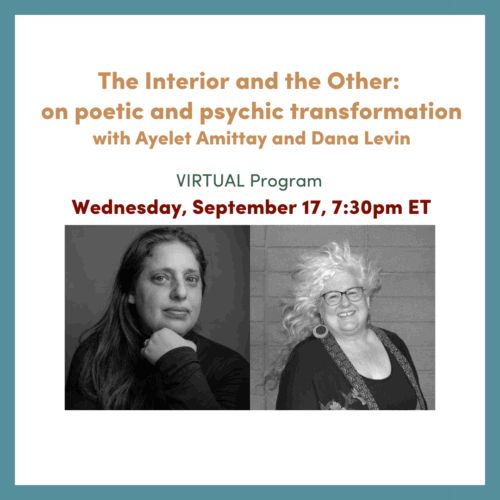
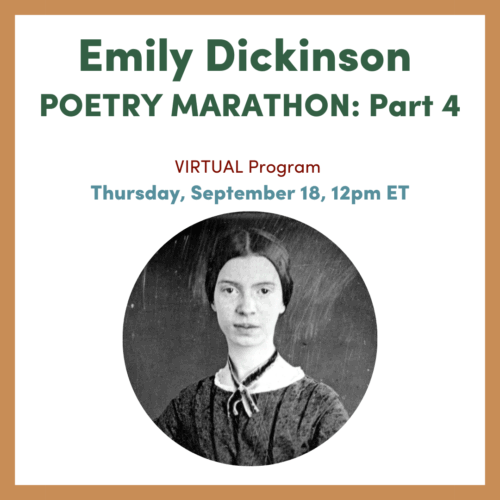
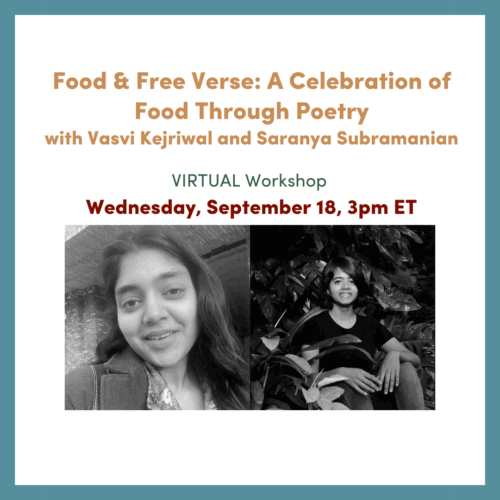
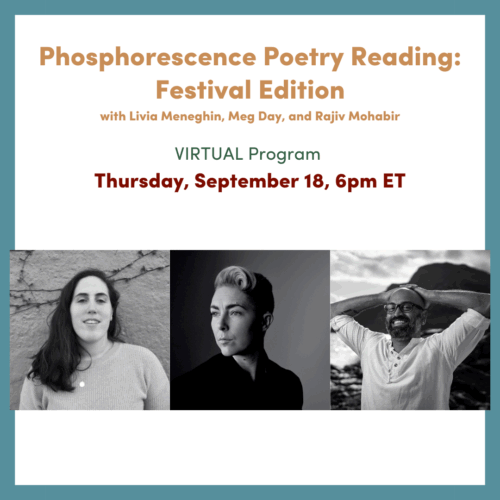
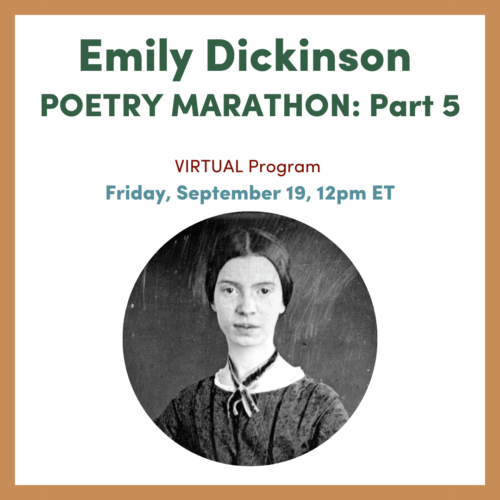
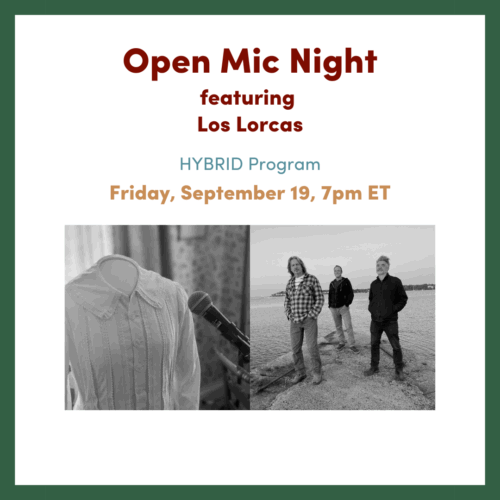
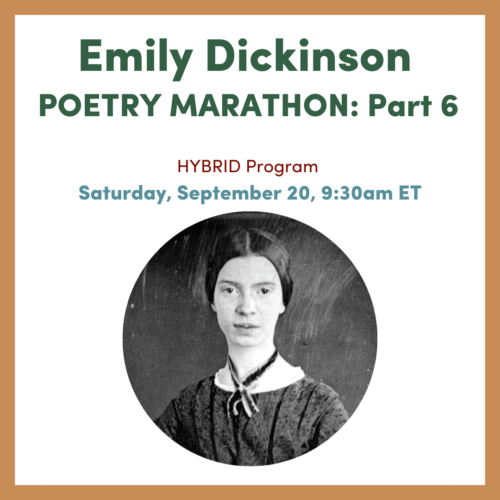
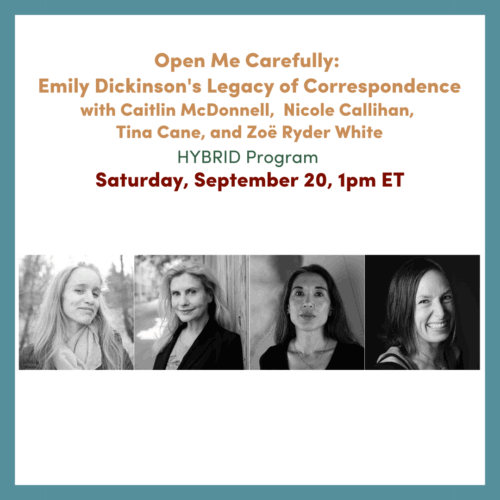
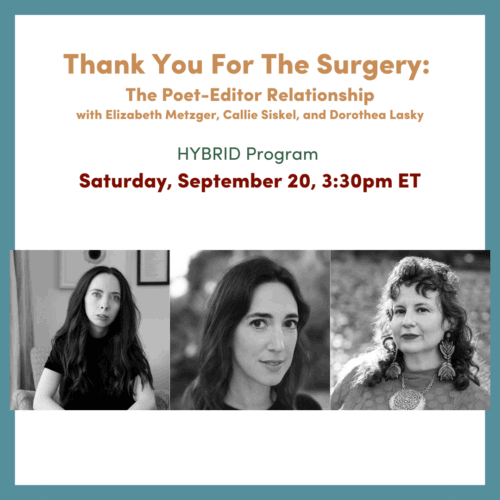
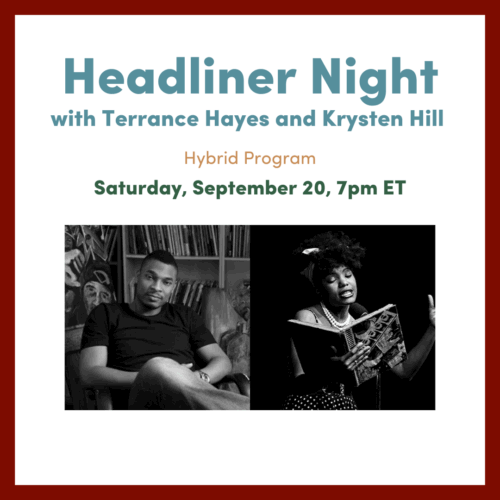
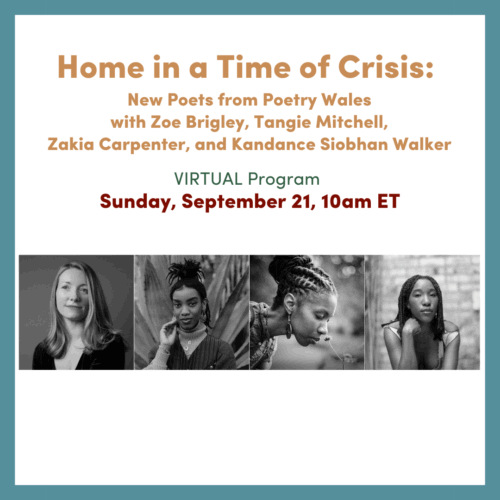
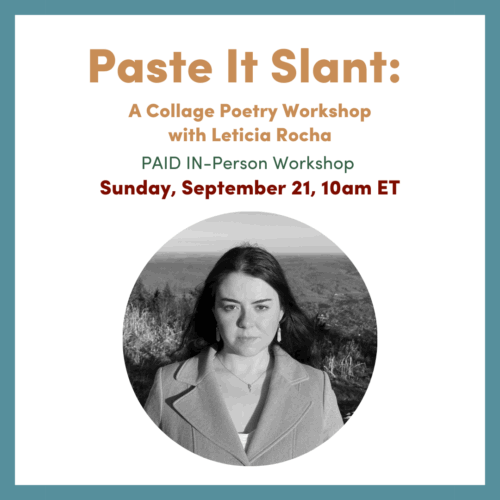
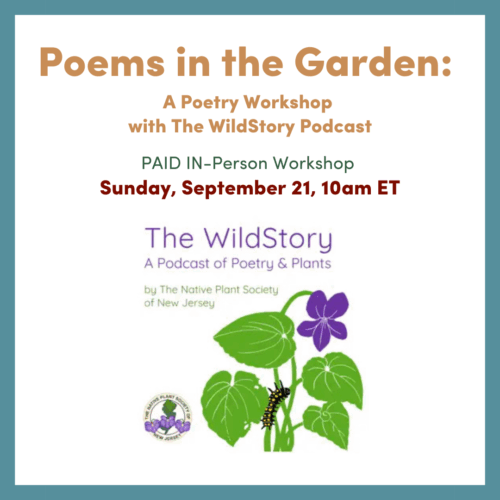
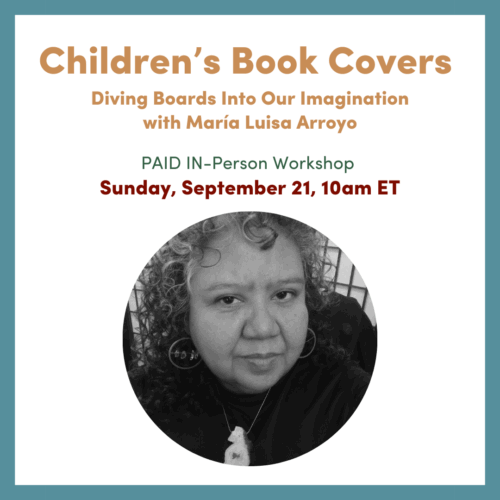
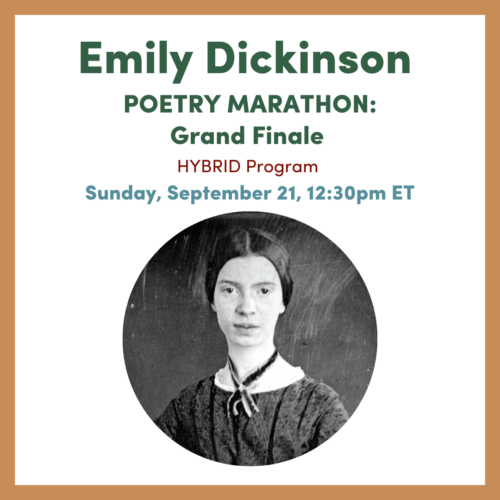
REGISTER
Monday, September 15:
6-8:30pm [Virtual Program] — Emily Dickinson Poetry Marathon: Part 1
A group reading of all 1,789 poems by Emily Dickinson over the course of 7 sessions. This session takes place entirely virtually and is open to both readers and listeners. We will be reading from Ralph Franklin’s The Poems of Emily Dickinson: Reading Edition. Sign up as a listener by registering for the Festival, or check back here soon to learn more about signing up as a reader!
Tuesday, September 16:
12-2:15pm [Virtual Program] — Emily Dickinson Poetry Marathon: Part 2
A group reading of all 1,789 poems by Emily Dickinson over the course of 7 sessions. This session takes place entirely virtually and is open to both readers and listeners. We will be reading from Ralph Franklin’s The Poems of Emily Dickinson: Reading Edition. Sign up as a listener by registering for the Festival, or check back here soon to learn more about signing up as a reader!
3:30-5pm [Virtual Workshop] — The Beauty of Objectivity
This workshop provides beginning poets with a framework for analyzing poetry with an objective approach centered on craft elements. Participants will analyze Dickinson’s poems and contemporary examples, and they will generate and analyze their own poetry in response to Dickinson-centered prompts.
Featuring Mary Robles and Lucas Clark.
6:30-8pm [Virtual Workshop] — Putting the Wit in Witness: Bringing Levity to Heavy Topics
In this generative workshop, we turn to Dickinson and other contemporary poets who use a light hand to address tough subjects. Through readings and interactive writing exercises, participants will explore the power of this approach to inspire their own writing.
Featuring Amie Whittemore and Jung Hae Chae.
Wednesday, September 17:
12-2:15pm [Virtual Program] — Emily Dickinson Poetry Marathon: Part 3
A group reading of all 1,789 poems by Emily Dickinson over the course of 7 sessions. This session takes place entirely virtually and is open to both readers and listeners. We will be reading from Ralph Franklin’s The Poems of Emily Dickinson: Reading Edition. Sign up as a listener by registering for the Festival, or check back here soon to learn more about signing up as a reader!
2:30-4pm [Virtual Workshop] — Letters to the World: Epistolary Creativity Workshop
In this gentle and good-humored generative writing program, participants will play with letter-writing as a form of poetic and personal expression while drawing inspiration from Dickinson’s own letters. Guided freewriting sessions will be followed by opportunities for sharing and reflection. No experience necessary.
Featuring Sylvie Cathrall.
4:30-6pm [Virtual Panel] — From Blank to Blank: How and Why to Use Blackout Poetry
What do acts of erasure afford a writer? In this interactive workshop, we’ll be looking closely at resonant models of erasure (including Nicole Sealey, Sarah Sloat, Tracy K. Smith, and Jennifer Sperry Steinorth), and exploring the effects of different blackout poetry strategies.
Featuring Matt Donovan and Jenny George, authors of We are Not Where We Are, an erasing of Thoreau’s Walden.
7:30-9pm [Virtual Workshop] — The Interior and the Other: on poetic and psychic transformation
What can poetry teach us about psychoanalysis, and the process of sharing one’s inner self with another? What can therapeutic or healing work teach us about writing poems? In this panel, two poets who have written about and undergone forms of therapy will explore the art and practice of writing about interiority and healing.
Featuring Ayelet Amittay and Dana Levin.
Thursday, September 18:
12-2:15pm [Virtual Program] — Emily Dickinson Poetry Marathon: Part 4
A group reading of all 1,789 poems by Emily Dickinson over the course of 7 sessions. This session takes place entirely virtually and is open to both readers and listeners. We will be reading from Ralph Franklin’s The Poems of Emily Dickinson: Reading Edition. Sign up as a listener by registering for the Festival, or check back here soon to learn more about signing up as a reader!
3-4:30pm [Virtual Workshop] — Food & Free Verse: A Celebration of Food Through Poetry
Meditate on different ways to perceive the way food nourishes the soul, just like a poem does: through memory and survival, through gratitude, through synaesthesia, through love languages and through socio-economic commentary. This is a unique poetry generative writing workshop for writers of all levels.
Featuring Ayelet Amittay and Dana Levin.
6-7:15pm [Virtual Reading] — Phosphorescence Contemporary Poetry Reading
Festival edition of the Museum’s monthly poetry reading series. Hear from poets around the world as they read their work and discuss what poetry and Dickinson mean to them.
Featuring Livia Meneghin, Meg Day, and Rajiv Mohabir.
Friday, September 19:
12-2:15pm [Virtual] — Emily Dickinson Poetry Marathon: Part 5
A group reading of all 1,789 poems by Emily Dickinson over the course of 7 sessions. This session takes place entirely virtually and is open to both readers and listeners. We will be reading from Ralph Franklin’s The Poems of Emily Dickinson: Reading Edition. Sign up as a listener by registering for the Festival, or check back here soon to learn more about signing up as a reader!
7-8:30pm [Hybrid Reading] — Open Mic Night
Bring your poems to Emily Dickinson’s garden! Readers will have 4 minutes each to make us feel “physically as if the top of [our] head[s] were taken off!” (Emily Dickinson to Thomas Wentworth Higginson, 16 August 1870). Las Lorcas will perform after the Open Mic. Open mic sign-ups will be handled in advance via a Google Form, and selected readers will be notified.
Saturday, September 20:
9:30am-12pm[Hybrid] — Emily Dickinson Poetry Marathon: Part 6
A group reading of all 1,789 poems by Emily Dickinson over the course of 7 sessions. For this session, readers must be present on-site, but listeners are welcome both in-person and online. We will be reading from Ralph Franklin’s The Poems of Emily Dickinson: Reading Edition. Gingerbread cookies inspired by Dickinson’s own recipe will be served. Sign up as a listener by registering for the Festival, or check back here soon to learn more about signing up as a reader!
1-2:30pm [In-Person Workshop] — Open Me Carefully: Emily Dickinson’s Legacy of Correspondence
Emily Dickinson is known to have written more than a thousand intimate and poetic letters in her lifetime. In this workshop, poets will discuss the necessity and ascendancy of correspondence in their own lives and work. Panelists will consider poetry’s deep intersection of private world and public sphere, and then ask participants to do the same as they pen their own letter-poems.
Featuring Caitlin McDonnell, Nicole Callihan, Tina Cane, and Zoë Ryder White.
3:30-5pm [In-Person Panel] — Thank You For The Surgery: The Poet-Editor Relationship
In a poetry world in which many editors are poets themselves, and a main avenue for becoming a poet is the workshop classroom, how might the editor-poet relationship create a correspondence that is at once formative, supportive, and expansive, and a relationship that is personally and professionally meaningful and ideally non-hierarchical?
Featuring Elizabeth Metzger, Callie Siskel, and Dorothea Lasky.
7-9pm [Hybrid Reading] — Headliner Night with Terrance Hayes and Krysten Hill
Join us in Emily Dickinson’s garden or virtually for a celebration of creativity and poetry! Our headlining poet, Terrance Hayes, will read from his work and discuss poetic practice and inspiration.
Sunday, September 21:
10-11:30am [Virtual Panel] — Home in a Time of Crisis: New Poets from Poetry Wales
Where do we find home, belonging and comfort in a time of crisis? What might Emily Dickinson tell us about how to find comfort and strength when it sometimes feels like nothing we do can change things for the better?
Featuring Zoe Brigley, Tangie Mitchell, Zakia Carpenter, and Kandance Siobhan Walker.
10-11:30am [Paid In-Person Workshop] — Paste It Slant: A Collage Poetry Workshop
Join for a generative workshop that pairs the visual art form of collage with poetry! Participants will be guided through a process of discovery with different collaging materials and text to create their own hand-crafted collage. All levels of experience with poetry and visual art are welcome.
Featuring Leticia Rocha.
10-11:30am [Paid In-Person Workshop] — Poems in the Garden: A Poetry Workshop with The WildStory Podcast
In this generative workshop led by The WildStory Podcast host Ann E. Wallace and featured guest Elizabeth Sylvia, poetry and nature enthusiasts of all ages and experience levels are invited to slow down and open their senses to the natural world—the memories it holds, the meanings it carries, and the feelings it inspires. Participants will engage in writing exercises, learn new strategies, and compose a poem draft during the session.
Featuring Ann Wallace and Elizabeth Sylvia.
10-11:30am [Paid In-Person Workshop] — Children’s Book Covers: Diving Boards Into Our Imagination
Beginner and experienced poets of all ages are invited to come and use children’s book covers as diving boards into memory and imagination. Children’s books will be on hand to browse, and participants will also be encouraged to search online for their own current or past favorite children’s books. Using one or more of the five senses (sight, sound, touch, smell & taste), participants will generate drafts of new poems as the vivid literary landscape of rhymes, illustration, and stories of childhood spark memories and new ideas.
Featuring María Luisa Arroyo.
12:30-2:30pm [Hybrid] — Emily Dickinson Poetry Marathon: Grand Finale
A group reading of all 1,789 poems by Emily Dickinson over the course of 7 sessions. For this session, readers must be present on-site, but listeners are welcome both in-person and online. We will read from Ralph Franklin’s The Poems of Emily Dickinson: Reading Edition. Stay to the end to enjoy a celebratory slice of coconut cake inspired by Dickinson’s own recipe. Sign up as a listener by registering for the Festival, or check back here soon to learn more about signing up as a reader!
REGISTER
About the Festival:
The Emily Dickinson Museum’s Annual Tell It Slant Poetry Festival is an event with international reach that celebrates Emily Dickinson’s poetic legacy and the contemporary creativity she and her work continues to inspire from the place she called home.
The Festival is named for Dickinson’s poem, “Tell all the truth but tell it slant,” underscoring the revolutionary power of poetry to shift our perspective and reveal new truths. Festival organizers are committed to featuring established and emerging poets who represent the diversity of the contemporary poetry landscape and to fostering community by placing poetry in the public sphere.
This year’s line-up features workshops, panels, and readings, by a diverse and talented group of poets from around the world. The cornerstone of the Festival, the Emily Dickinson Poetry Marathon, is an epic reading of all 1,789 of Emily Dickinson’s poems.
To follow along with the Emily Dickinson Poetry Marathon, get your copy of the Franklin edition from the Emily Dickinson Museum Shop.
The annual event attracts a diverse audience of Dickinson fans and poetry lovers, including students, educators, aspiring writers, and those who are new to poetry and literary events. Past Festival headliners have included Carl Phillips, Marilyn Nelson, Abigail Chabitnoy, Tracy K. Smith, Tiana Clark, Tess Taylor, Ada Limón, Jericho Brown, Franny Choi, Aimee Nezhukumatathil, Paisley Rekdal, Adrian Matejka, Kaveh Akbar, and Ocean Vuong.
Support The Tell It Slant Poetry Festival:
Admission to all Poetry Festival events is free–made possible by contributions from Museum supporters.
Please consider making a donation of any size during the registration process or anytime on the Museum’s website.
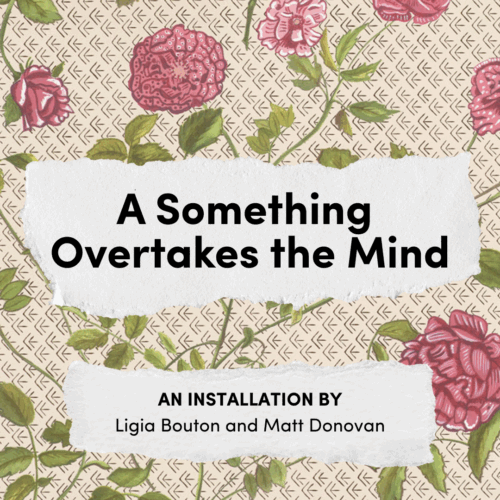
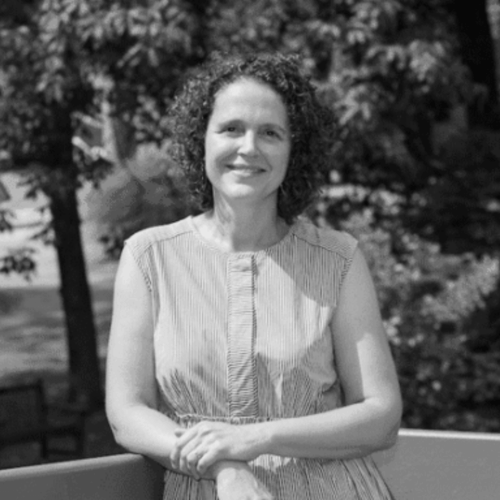 Ligia Bouton was born in Sao Paulo, Brazil, and currently divides her time between Massachusetts and New Mexico in the US. Her creative work combines sculpture and photography with performance and digital video to recreate appropriated narratives and research drawn from the history of science, literature, and other sources. Bouton’s recent projects have been shown at museums such as the Copenhagen Contemporary (Denmark), Crystal Bridges Museum of American Art, the National Museum of Women in the Arts, Guildhall Art Gallery (London, UK), Minneapolis Institute of Art, SITE Santa Fe, the New Mexico Museum of Art, the Philadelphia Art Alliance, Bellevue Arts Museum, the Minneapolis Institute of Art, and the Boulder Museum of Contemporary Art. In 2016, Bouton’s work was featured in the exhibition, “Charlotte Great and Small,” celebrating the bicentenary of Charlotte Brontë’s birth at the Brontë Parsonage Museum in Yorkshire, England. Bouton’s video work has been shown at Art Claims Impulse in Berlin, in the Biennial of Contemporary Art, Nimes, France, and at the Temporary Art Center, Eindhoven, The Netherlands, as well as in The Female Avant Garde Festival in Prague. Reviews of this work have appeared in Art in America, Art Papers, The Art Newspaper, Art Ltd., and The New York Times. She is the recipient of a 2016 Creative Capital grant for the opera “Inheritance” which premiered at University of California, San Diego in 2018 and a 2020 Smithsonian Artist Research Fellowship for her project “25 Stars: A Temporary Monument for Henrietta Swan Leavitt”. Her work can be found in numerous public and private collections including Crystal Bridges Museum, the Albuquerque Museum, St. John’s College, and the Falconer Gallery at Grinnell College. Bouton is currently Professor of Art Studio at Mount Holyoke College in South Hadley, Massachusetts.
Ligia Bouton was born in Sao Paulo, Brazil, and currently divides her time between Massachusetts and New Mexico in the US. Her creative work combines sculpture and photography with performance and digital video to recreate appropriated narratives and research drawn from the history of science, literature, and other sources. Bouton’s recent projects have been shown at museums such as the Copenhagen Contemporary (Denmark), Crystal Bridges Museum of American Art, the National Museum of Women in the Arts, Guildhall Art Gallery (London, UK), Minneapolis Institute of Art, SITE Santa Fe, the New Mexico Museum of Art, the Philadelphia Art Alliance, Bellevue Arts Museum, the Minneapolis Institute of Art, and the Boulder Museum of Contemporary Art. In 2016, Bouton’s work was featured in the exhibition, “Charlotte Great and Small,” celebrating the bicentenary of Charlotte Brontë’s birth at the Brontë Parsonage Museum in Yorkshire, England. Bouton’s video work has been shown at Art Claims Impulse in Berlin, in the Biennial of Contemporary Art, Nimes, France, and at the Temporary Art Center, Eindhoven, The Netherlands, as well as in The Female Avant Garde Festival in Prague. Reviews of this work have appeared in Art in America, Art Papers, The Art Newspaper, Art Ltd., and The New York Times. She is the recipient of a 2016 Creative Capital grant for the opera “Inheritance” which premiered at University of California, San Diego in 2018 and a 2020 Smithsonian Artist Research Fellowship for her project “25 Stars: A Temporary Monument for Henrietta Swan Leavitt”. Her work can be found in numerous public and private collections including Crystal Bridges Museum, the Albuquerque Museum, St. John’s College, and the Falconer Gallery at Grinnell College. Bouton is currently Professor of Art Studio at Mount Holyoke College in South Hadley, Massachusetts.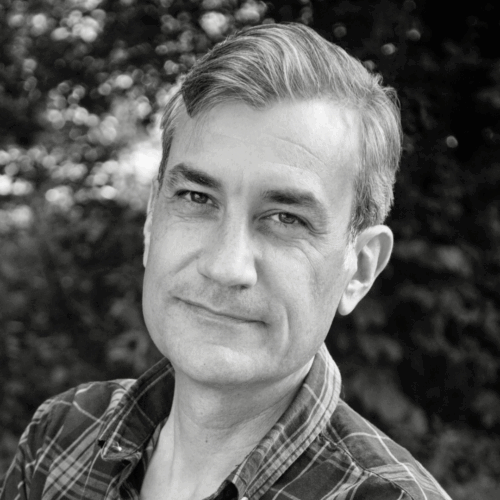 Matt Donovan is the author of four books and two chapbooks: We Are Not Where We Are (an erasure of Walden, co-authored with Jenny George, Bull City Press 2025), The Dug-Up Gun Museum (a collection of poems about guns and gun violence in America, BOA 2022), Missing Department (a collaborative collection of art and poetry created with artist Ligia Bouton, Visual Studies Workshop 2023), A Cloud of Unusual Size and Shape: Meditations on Ruin and Redemption (a book of lyric essays, Trinity University Press 2016), Rapture & the Big Bam (selected by Lia Purpura for the Snowbound Chapbook Competition, Tupelo Press 2016), and Vellum (selected by Mark Doty for the Bakeless Contest, Houghton Mifflin 2007). Donovan is the recipient of a Whiting Award, a Rome Prize in Literature, a Pushcart Prize, a Levis Reading Prize, and an NEA Fellowship in Literature. His work has appeared in numerous journals, including AGNI, American Poetry Review, The Believer, Kenyon Review, The New England Review, Poetry, Threepenny Review, and Virginia Quarterly Review. Donovan serves as Director of the Boutelle-Day Poetry Center at Smith College.
Matt Donovan is the author of four books and two chapbooks: We Are Not Where We Are (an erasure of Walden, co-authored with Jenny George, Bull City Press 2025), The Dug-Up Gun Museum (a collection of poems about guns and gun violence in America, BOA 2022), Missing Department (a collaborative collection of art and poetry created with artist Ligia Bouton, Visual Studies Workshop 2023), A Cloud of Unusual Size and Shape: Meditations on Ruin and Redemption (a book of lyric essays, Trinity University Press 2016), Rapture & the Big Bam (selected by Lia Purpura for the Snowbound Chapbook Competition, Tupelo Press 2016), and Vellum (selected by Mark Doty for the Bakeless Contest, Houghton Mifflin 2007). Donovan is the recipient of a Whiting Award, a Rome Prize in Literature, a Pushcart Prize, a Levis Reading Prize, and an NEA Fellowship in Literature. His work has appeared in numerous journals, including AGNI, American Poetry Review, The Believer, Kenyon Review, The New England Review, Poetry, Threepenny Review, and Virginia Quarterly Review. Donovan serves as Director of the Boutelle-Day Poetry Center at Smith College.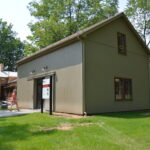
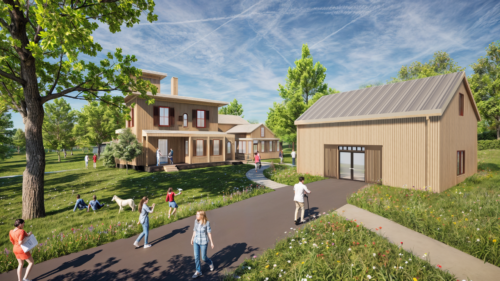
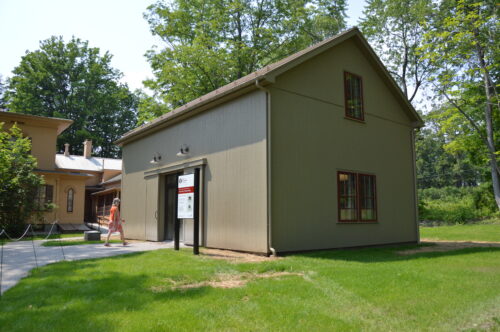 The Carriage House achieves this through five core principles:
The Carriage House achieves this through five core principles: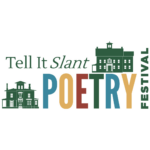























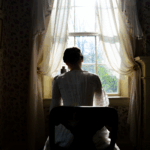
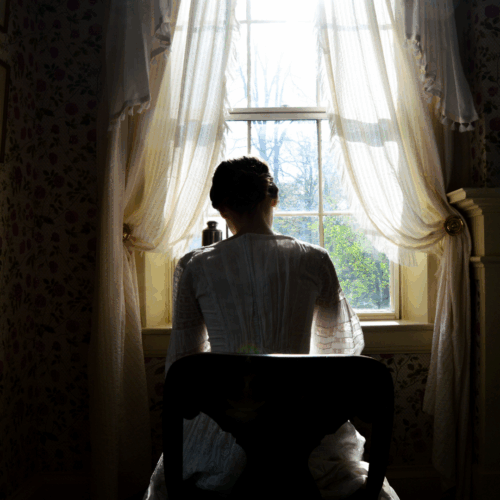 “
“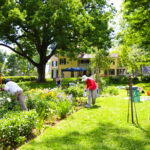
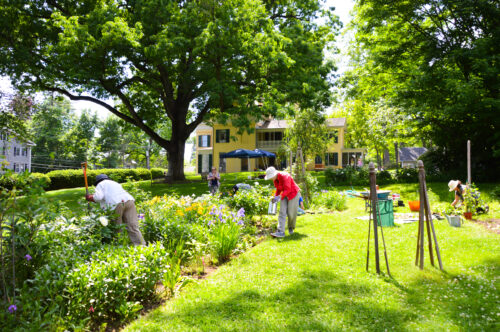
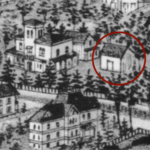
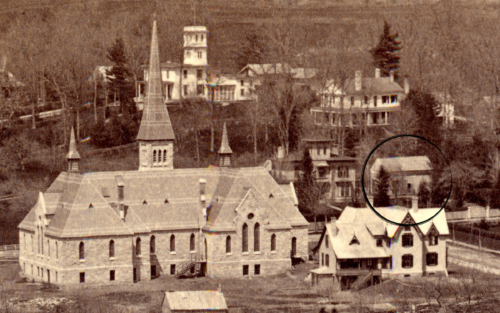
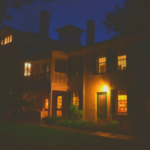
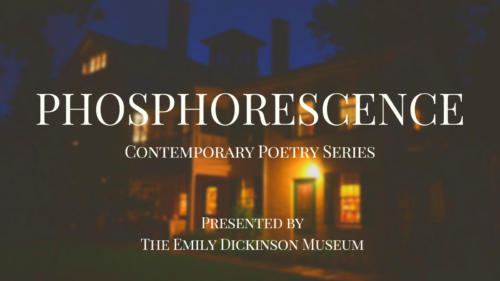
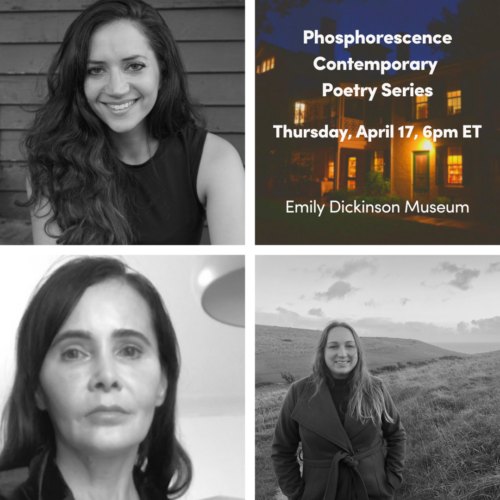 Thursday, April 17, 6pm ET
Thursday, April 17, 6pm ET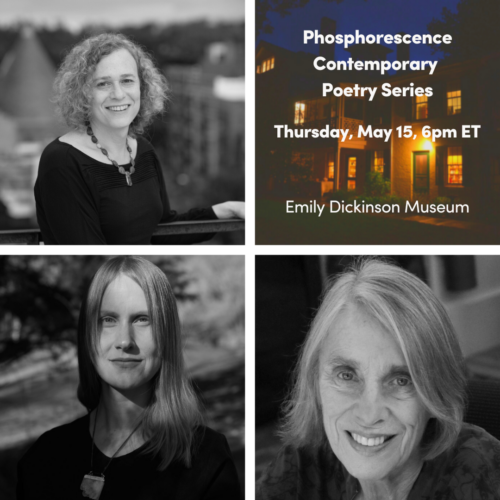 Thursday, May 15, 6pm ET
Thursday, May 15, 6pm ET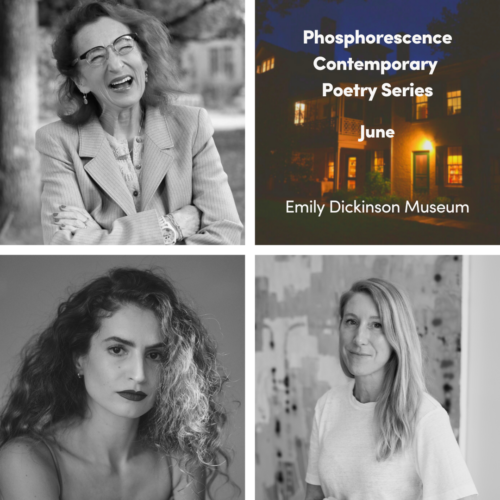
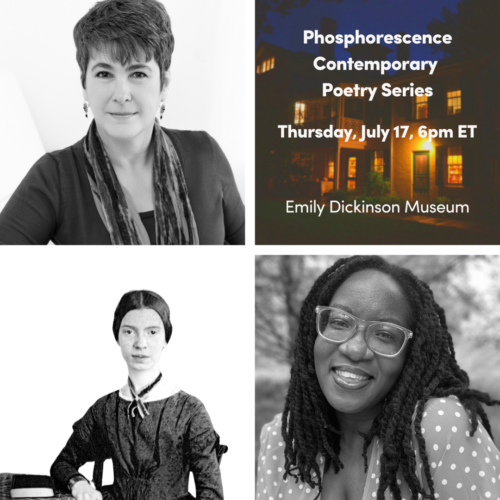 Thursday, July 17, 6pm ET
Thursday, July 17, 6pm ET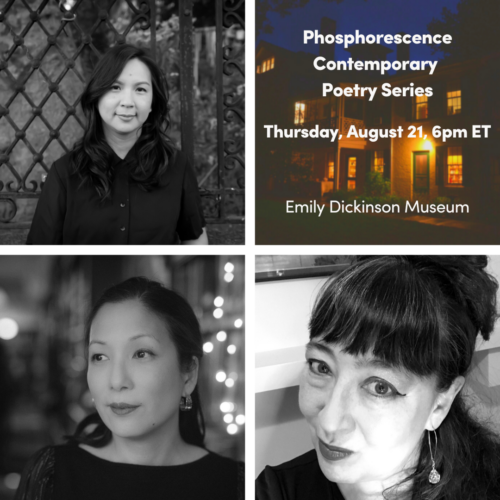 Thursday, August 21, 6pm ET
Thursday, August 21, 6pm ET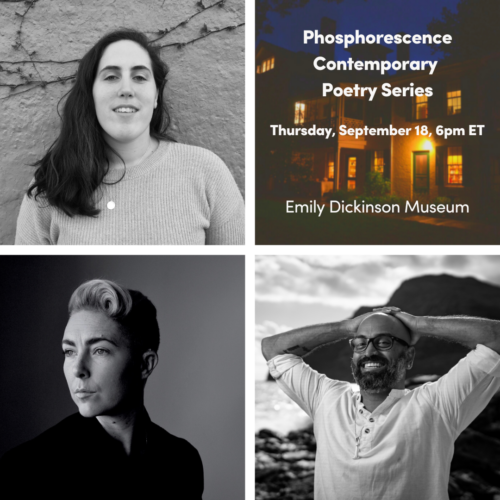 Thursday, September 18, 6pm ET
Thursday, September 18, 6pm ET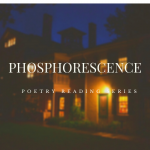
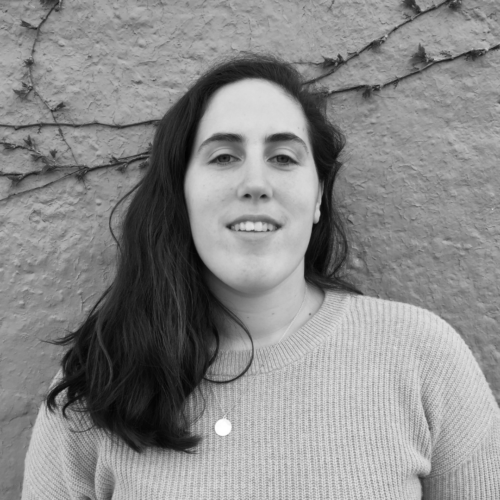
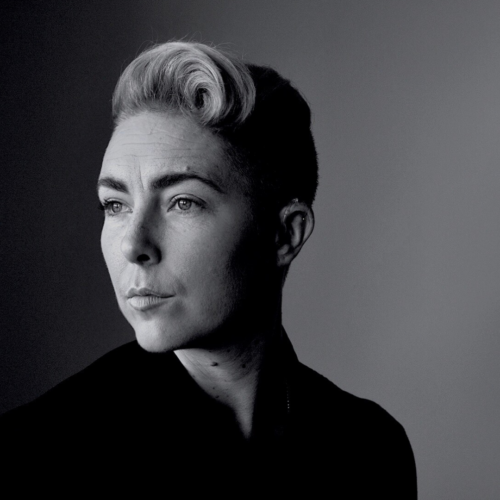 Deaf, genderqueer poet Meg Day is the author of Last Psalm at Sea Level (Barrow Street, 2014), winner of the Publishing Triangle’s Audre Lorde Award, and a finalist for the 2016 Kate Tufts Discovery Award, and the co-editor of Laura Hershey: On the Life & Work of an American Master (Pleiades, 2019). The 2015-2016 recipient of the Amy Lowell Poetry Travelling Scholarship and a 2013 recipient of an NEA Fellowship in Poetry, Day’s work can be found in, or forthcoming from, Best American Poetry, The New York Times, Poetry Magazine, & elsewhere. Day is the 2024 Guggenheim Poet-in-Residence and an Assistant Professor of English & Creative Writing in the MFA Program at NC State.
Deaf, genderqueer poet Meg Day is the author of Last Psalm at Sea Level (Barrow Street, 2014), winner of the Publishing Triangle’s Audre Lorde Award, and a finalist for the 2016 Kate Tufts Discovery Award, and the co-editor of Laura Hershey: On the Life & Work of an American Master (Pleiades, 2019). The 2015-2016 recipient of the Amy Lowell Poetry Travelling Scholarship and a 2013 recipient of an NEA Fellowship in Poetry, Day’s work can be found in, or forthcoming from, Best American Poetry, The New York Times, Poetry Magazine, & elsewhere. Day is the 2024 Guggenheim Poet-in-Residence and an Assistant Professor of English & Creative Writing in the MFA Program at NC State.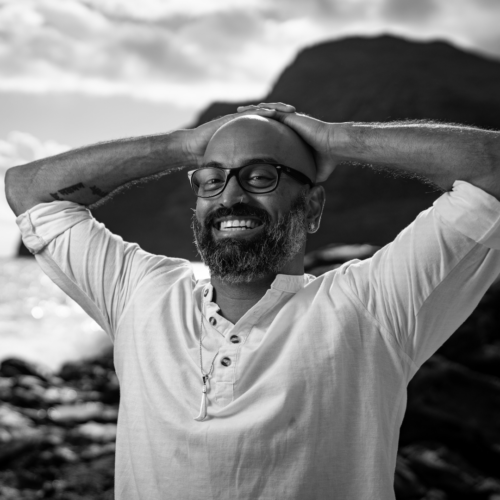 Poet, memoirist, and translator, Rajiv Mohabir is the author of four books of poetry including Cutlish (Four Way Books 2021) which was a finalist for the National Book Critics Circle Award and recipient of the Eric Hoffer Medal Provocateur. His poetry and nonfiction have been finalists for the 2022 PEN/America Open Book Award, the Lambda Literary Award in Poetry and in Nonfiction, the Randy Shilts Award for Gay Nonfiction, and both second place and finalist for the Guyana Prize for Literature in 2022 (poetry and memoir respectively). His translations have won the Harold Morton Landon Translation Award from the American Academy of Poets in 2020. Whale Aria (Four Way Books 2023) is his fourth collection of poetry and currently he is an assistant professor of poetry at the University of Colorado Boulder.
Poet, memoirist, and translator, Rajiv Mohabir is the author of four books of poetry including Cutlish (Four Way Books 2021) which was a finalist for the National Book Critics Circle Award and recipient of the Eric Hoffer Medal Provocateur. His poetry and nonfiction have been finalists for the 2022 PEN/America Open Book Award, the Lambda Literary Award in Poetry and in Nonfiction, the Randy Shilts Award for Gay Nonfiction, and both second place and finalist for the Guyana Prize for Literature in 2022 (poetry and memoir respectively). His translations have won the Harold Morton Landon Translation Award from the American Academy of Poets in 2020. Whale Aria (Four Way Books 2023) is his fourth collection of poetry and currently he is an assistant professor of poetry at the University of Colorado Boulder.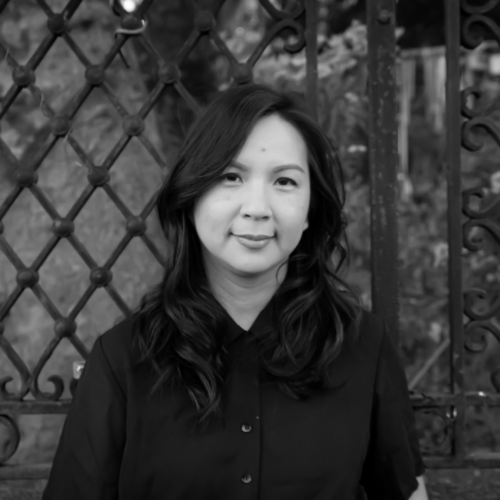
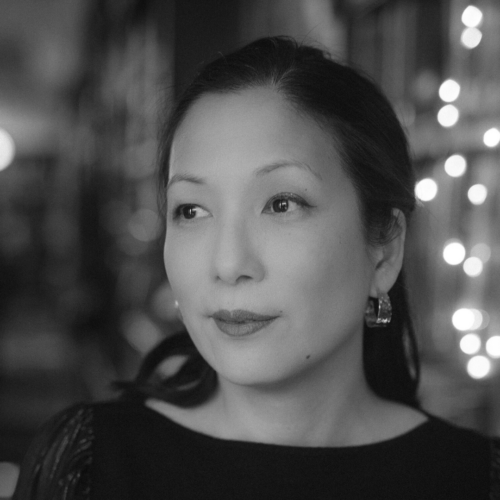 Monica Ong is a visual poet and the author of Silent Anatomies (Kore Press, 2015). A graduate of the Rhode Island School of Design, Ong brings a designer’s eye to experimental writing with her hybrid image-poems and installations that surface hidden narratives of women and diaspora. Her poetry can be found in Scientific American, ctrl+v, and Poetry Magazine, and in the anthology A Mouth Holds Many Things: A De-Canon Hybrid-Literary Collection (Fonograf Editions, 2024). Ong’s most recent series of astronomy-inspired visual poetry was exhibited at the Poetry Foundation and is the basis of her new book Planetaria (Proxima Vera, 2025). You can find her fine press visual poetry editions and literary art objects in over fifty distinguished institutional collections worldwide including Amherst College. In 2024, Ong was named a United States Artists Fellow in Writing.
Monica Ong is a visual poet and the author of Silent Anatomies (Kore Press, 2015). A graduate of the Rhode Island School of Design, Ong brings a designer’s eye to experimental writing with her hybrid image-poems and installations that surface hidden narratives of women and diaspora. Her poetry can be found in Scientific American, ctrl+v, and Poetry Magazine, and in the anthology A Mouth Holds Many Things: A De-Canon Hybrid-Literary Collection (Fonograf Editions, 2024). Ong’s most recent series of astronomy-inspired visual poetry was exhibited at the Poetry Foundation and is the basis of her new book Planetaria (Proxima Vera, 2025). You can find her fine press visual poetry editions and literary art objects in over fifty distinguished institutional collections worldwide including Amherst College. In 2024, Ong was named a United States Artists Fellow in Writing.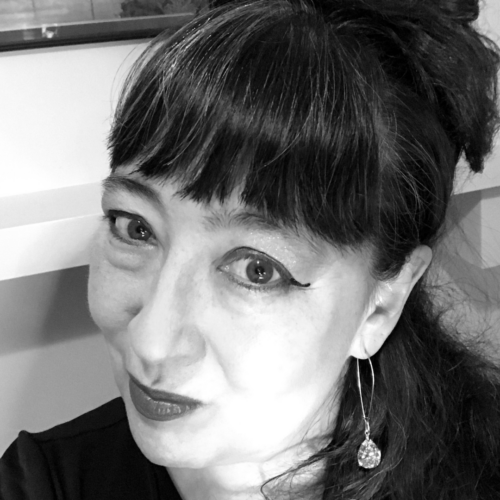 Lee Ann Roripaugh (she/they) is a biracial Nisei and the author of five volumes of poetry, most recently tsunami vs. the fukushima 50 (Milkweed Editions, 2019), which was named a “Best Book of 2019” by the New York Public Library, selected as a poetry Finalist in the 2020 Lambda Literary Awards, cited as a Society of Midland Authors 2020 Honoree in Poetry, and was named one of the “50 Must-Read Poetry Collections in 2019” by Book Riot. Her collection of fiction, Reveal Codes, was selected as winner of the Moon City Press Short Fiction Award and published by Moon City Press in late 2023, and their chapbook, #stringofbeads, a winner in the Diode Editions Chapbook Competition, was released from Diode Press in 2023. She was named winner of the Association of Asian American Studies Book Award in Poetry/Prose for 2004, and a 1998 winner of the National Poetry Series. The South Dakota State Poet Laureate from 2015-2019, Roripaugh is a Professor of English at the University of South Dakota, where they serve as Editor-in-Chief of South Dakota Review.
Lee Ann Roripaugh (she/they) is a biracial Nisei and the author of five volumes of poetry, most recently tsunami vs. the fukushima 50 (Milkweed Editions, 2019), which was named a “Best Book of 2019” by the New York Public Library, selected as a poetry Finalist in the 2020 Lambda Literary Awards, cited as a Society of Midland Authors 2020 Honoree in Poetry, and was named one of the “50 Must-Read Poetry Collections in 2019” by Book Riot. Her collection of fiction, Reveal Codes, was selected as winner of the Moon City Press Short Fiction Award and published by Moon City Press in late 2023, and their chapbook, #stringofbeads, a winner in the Diode Editions Chapbook Competition, was released from Diode Press in 2023. She was named winner of the Association of Asian American Studies Book Award in Poetry/Prose for 2004, and a 1998 winner of the National Poetry Series. The South Dakota State Poet Laureate from 2015-2019, Roripaugh is a Professor of English at the University of South Dakota, where they serve as Editor-in-Chief of South Dakota Review.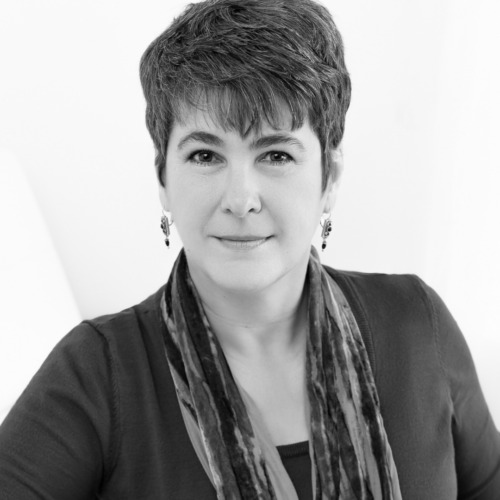
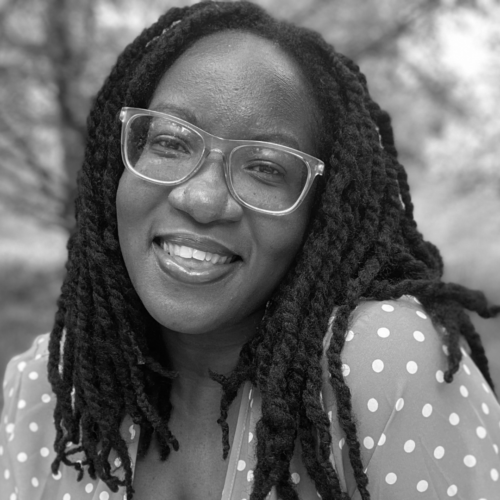 Nadia Alexis is a poet, writer, and photographer born and raised in Harlem, New York City to Haitian immigrants, and she currently resides in Mississippi. Her debut full-length collection of poetry and photography, Beyond the Watershed, is forthcoming with CavanKerry Press in March 2025, and it was also a finalist for the 2022 Ghost Peach Press Prize. Her writing and photography have been published widely, and she has received several awards and honors including a 2025 Literary Arts Fellowship and a 2024 Artist Mini-Grant from the Mississippi Arts Commission, a 2024 Mississippi STAR Teacher Award, a 2024 Vance Fellowship from the Natchez Literary and Cinema Celebration, the 2023 Poet of the Year Honoree of the Haitian Creatives Digital Awards, a semifinalist position in the 2020 92Y Discovery Poetry Contest, a nomination for the 2020 Mississippi Institute of Arts and Letters photography award, and an honorable mention prize in the 2019 Hurston/Wright College Writers Award for poetry. Nadia’s photography has been exhibited in several shows in the U.S., Cuba, and virtually. A fellow of the Callaloo Creative Writing Workshop, The Watering Hole, and the Poets & Writers Get the Word Out Publicity Incubator, she holds a PhD and an MFA in Creative Writing from the University of Mississippi.
Nadia Alexis is a poet, writer, and photographer born and raised in Harlem, New York City to Haitian immigrants, and she currently resides in Mississippi. Her debut full-length collection of poetry and photography, Beyond the Watershed, is forthcoming with CavanKerry Press in March 2025, and it was also a finalist for the 2022 Ghost Peach Press Prize. Her writing and photography have been published widely, and she has received several awards and honors including a 2025 Literary Arts Fellowship and a 2024 Artist Mini-Grant from the Mississippi Arts Commission, a 2024 Mississippi STAR Teacher Award, a 2024 Vance Fellowship from the Natchez Literary and Cinema Celebration, the 2023 Poet of the Year Honoree of the Haitian Creatives Digital Awards, a semifinalist position in the 2020 92Y Discovery Poetry Contest, a nomination for the 2020 Mississippi Institute of Arts and Letters photography award, and an honorable mention prize in the 2019 Hurston/Wright College Writers Award for poetry. Nadia’s photography has been exhibited in several shows in the U.S., Cuba, and virtually. A fellow of the Callaloo Creative Writing Workshop, The Watering Hole, and the Poets & Writers Get the Word Out Publicity Incubator, she holds a PhD and an MFA in Creative Writing from the University of Mississippi.